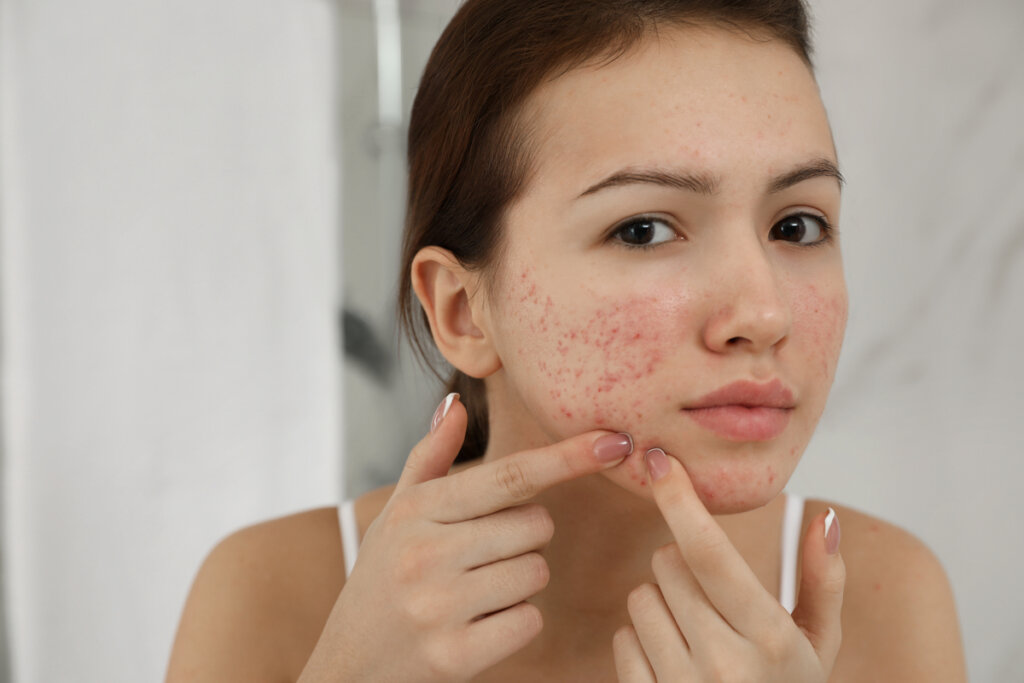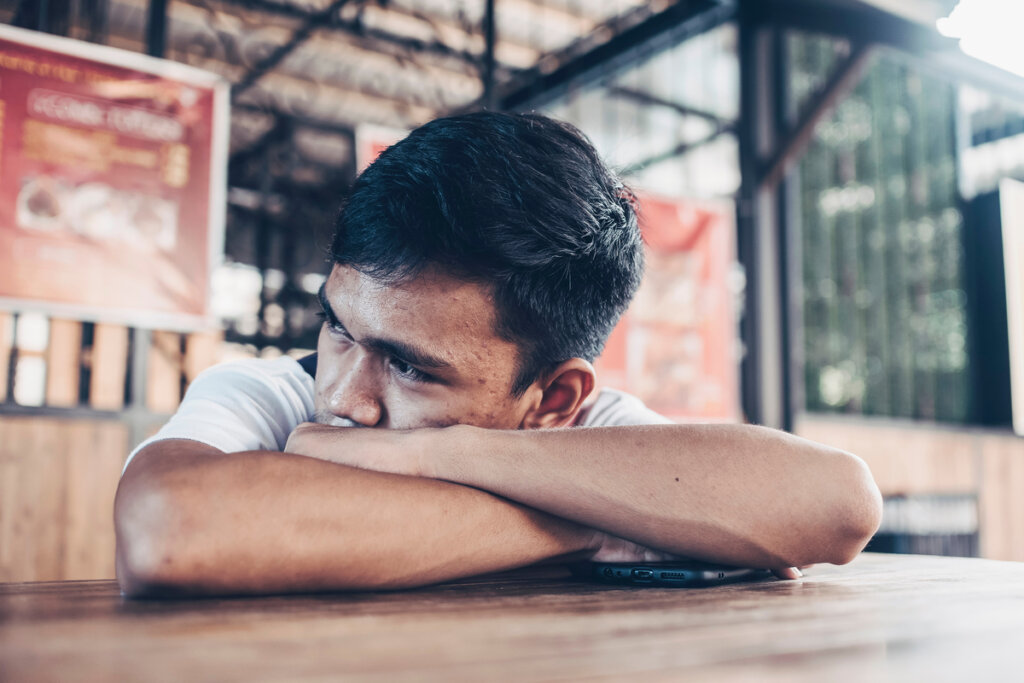The Psychological Impact of Acne in Adolescence


Written and verified by the psychologist Elena Sanz
If you’re already an adult, you’ll probably remember the magnitude that certain of your complexes reached in adolescence. Every little imperfection, every aspect of yourself that slightly deviated from the norm, was likely to generate great anguish and a strong feeling of inferiority in you. This is what happens with the appearance of pimples and blackheads. In fact, despite being a condition shared by many, the psychological impact of acne goes way beyond what you might think.
Acne is a condition highly associated with adolescence. It usually arises with the onset of puberty and is due to hormonal changes. It’s estimated that about 80 percent of young people between the ages of 12 and 18 suffer from acne. It often lasts into adulthood, especially in women.
As we mentioned earlier, the fact that acne is so common doesn’t detract from its impact. Indeed, despite not being a dangerous disease, it can cause a high degree of social and emotional dysfunction. Below, we take a look at the reasons for this effect.
The psychological impact of acne on self-image
Adolescence is a stage of searching, transformation, and creation of identity. During this process, personal image acquires great relevance as it’s the means that young people use to show themselves to the world.
It’s through their appearance that they project their attitudes, tastes, and preferences and blend in with their group. For this reason, it’s common for adolescents to dress in similar ways to their friends or alter their image when they change the company they keep.
However, acne greatly contributes to the creation of a negative self-image. It generates rejection and repulsion, and the young person feels worthless. This feeling is increased when they compare themselves to the retouched, filtered, and unreal images they see on social media.
Consequently, the adolescent can no longer rely on their image to project themselves onto the world. On the contrary, it becomes an element that causes them shame and constant uneasiness.

Its influence on interpersonal rejection
While self-image is key during adolescence, the peer group is as important or even more so. Indeed, peers become both their references and refuges. Hence, socialization with their peers is essential at this stage. In fact, they need to feel accepted if they’re to emotionally develop in a successful way.
Acne can become a reason for rejection, ridicule, or criticism. This makes it difficult for sufferers to establish friendships and those first romantic relationships that have such an impact on the adolescent. Indeed, an acne sufferer can feel humiliated and left out and can be rejected for the same reason.
Despite the fact that there are many complexes in adolescence, acne usually appears on the face and is quite striking. This makes it difficult to hide and, being always present, constantly influences their socialization processes.
The emotional consequences of suffering acne in adolescence
The two previous causes are the main origin of the psychological damage caused by acne during adolescence. However, these consequences can manifest themselves in various ways:
- The adolescent usually suffers from low self-esteem and has a negative self-concept. Their image displeases them, their relationships aren’t successful and, in short, they feel inferior or inadequate. The seriousness of this situation is such that, even once the acne problem has been treated or solved, the emotional repercussions can continue. That’s because adolescence is a critical period in the formation of self-esteem.
- The embarrassment of acne can lead young people to isolate themselves and restrict their socializing and leisure activities. Thus, by abandoning or giving up these stimulating opportunities, they can develop apathetic and negative emotional states, and even suffer from depression.
- Anxiety disorders are also extremely common in these cases. Anxiety can lead young people to desperately try to clear their acne, causing skin lesions and subsequent marks. If they’re especially vulnerable minors, they may suffer discomfort to the extent that it affects their school performance and other areas of their lives. Social phobia is usually one of the most common consequences.

Reducing the psychological impact of acne
This skin condition not only affects the physical level, but also has a profound influence on emotional well-being, social relationships, academic performance and leisure time. As a matter of fact, its impact can extend to virtually all areas of a young person’s life.
For this reason, it’s important not to minimize the adolescent’s discomfort and to seek help. Indeed, consulting a professional and finding the right treatment for acne can be a real lifesaver. However, it’s also essential to attend to the psychological and emotional plane. For instance, the young person needs to be able to express their insecurities and suffering and find support and understanding in this regard.
Therefore, it’s important that they’re helped at home to build solid self-esteem based on more than their physical appearance. One that allows maintaining an internal feeling of value and that acts as a protective factor.
In the superficial world of social media, and in the complicated (and sometimes cruel) stage of adolescence, the role of parents is essential to educate in values and emotional management. Nevertheless, if the psychological impact of acne is really high, it’s best to start a psychotherapy process to help the young person cope with it.
If you’re already an adult, you’ll probably remember the magnitude that certain of your complexes reached in adolescence. Every little imperfection, every aspect of yourself that slightly deviated from the norm, was likely to generate great anguish and a strong feeling of inferiority in you. This is what happens with the appearance of pimples and blackheads. In fact, despite being a condition shared by many, the psychological impact of acne goes way beyond what you might think.
Acne is a condition highly associated with adolescence. It usually arises with the onset of puberty and is due to hormonal changes. It’s estimated that about 80 percent of young people between the ages of 12 and 18 suffer from acne. It often lasts into adulthood, especially in women.
As we mentioned earlier, the fact that acne is so common doesn’t detract from its impact. Indeed, despite not being a dangerous disease, it can cause a high degree of social and emotional dysfunction. Below, we take a look at the reasons for this effect.
The psychological impact of acne on self-image
Adolescence is a stage of searching, transformation, and creation of identity. During this process, personal image acquires great relevance as it’s the means that young people use to show themselves to the world.
It’s through their appearance that they project their attitudes, tastes, and preferences and blend in with their group. For this reason, it’s common for adolescents to dress in similar ways to their friends or alter their image when they change the company they keep.
However, acne greatly contributes to the creation of a negative self-image. It generates rejection and repulsion, and the young person feels worthless. This feeling is increased when they compare themselves to the retouched, filtered, and unreal images they see on social media.
Consequently, the adolescent can no longer rely on their image to project themselves onto the world. On the contrary, it becomes an element that causes them shame and constant uneasiness.

Its influence on interpersonal rejection
While self-image is key during adolescence, the peer group is as important or even more so. Indeed, peers become both their references and refuges. Hence, socialization with their peers is essential at this stage. In fact, they need to feel accepted if they’re to emotionally develop in a successful way.
Acne can become a reason for rejection, ridicule, or criticism. This makes it difficult for sufferers to establish friendships and those first romantic relationships that have such an impact on the adolescent. Indeed, an acne sufferer can feel humiliated and left out and can be rejected for the same reason.
Despite the fact that there are many complexes in adolescence, acne usually appears on the face and is quite striking. This makes it difficult to hide and, being always present, constantly influences their socialization processes.
The emotional consequences of suffering acne in adolescence
The two previous causes are the main origin of the psychological damage caused by acne during adolescence. However, these consequences can manifest themselves in various ways:
- The adolescent usually suffers from low self-esteem and has a negative self-concept. Their image displeases them, their relationships aren’t successful and, in short, they feel inferior or inadequate. The seriousness of this situation is such that, even once the acne problem has been treated or solved, the emotional repercussions can continue. That’s because adolescence is a critical period in the formation of self-esteem.
- The embarrassment of acne can lead young people to isolate themselves and restrict their socializing and leisure activities. Thus, by abandoning or giving up these stimulating opportunities, they can develop apathetic and negative emotional states, and even suffer from depression.
- Anxiety disorders are also extremely common in these cases. Anxiety can lead young people to desperately try to clear their acne, causing skin lesions and subsequent marks. If they’re especially vulnerable minors, they may suffer discomfort to the extent that it affects their school performance and other areas of their lives. Social phobia is usually one of the most common consequences.

Reducing the psychological impact of acne
This skin condition not only affects the physical level, but also has a profound influence on emotional well-being, social relationships, academic performance and leisure time. As a matter of fact, its impact can extend to virtually all areas of a young person’s life.
For this reason, it’s important not to minimize the adolescent’s discomfort and to seek help. Indeed, consulting a professional and finding the right treatment for acne can be a real lifesaver. However, it’s also essential to attend to the psychological and emotional plane. For instance, the young person needs to be able to express their insecurities and suffering and find support and understanding in this regard.
Therefore, it’s important that they’re helped at home to build solid self-esteem based on more than their physical appearance. One that allows maintaining an internal feeling of value and that acts as a protective factor.
In the superficial world of social media, and in the complicated (and sometimes cruel) stage of adolescence, the role of parents is essential to educate in values and emotional management. Nevertheless, if the psychological impact of acne is really high, it’s best to start a psychotherapy process to help the young person cope with it.
All cited sources were thoroughly reviewed by our team to ensure their quality, reliability, currency, and validity. The bibliography of this article was considered reliable and of academic or scientific accuracy.
- Dréno, B. (2010, December). Recent data on epidemiology of acne. In Annales de Dermatologie et de Venereologie (Vol. 137, No. 12, pp. 3-5). Elsevier Masson.
- Kellett, S. C., & Gawkrodger, D. J. (1999). The psychological and emotional impact of acne and the effect of treatment with isotretinoin. The British journal of dermatology, 140(2), 273-282.
This text is provided for informational purposes only and does not replace consultation with a professional. If in doubt, consult your specialist.







